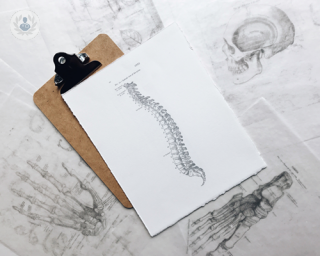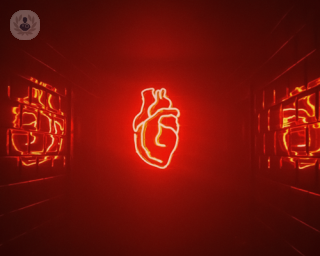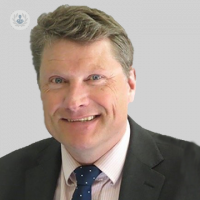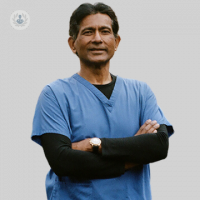What is spinal cord injury?
A spinal cord injury is damage to any part of the nerves that make up the spinal cord or spinal canal. These nerves are essential for coordinating movement in your body and sending brain signals to your muscles when you want to move.
A spinal cord injury is a serious a condition which can result in paralysis. The spine does not have to complete break for damage to the nerves to occur. The nerves in the spinal cord can also be damaged through impact or compression. The location of the damage – whether in the cervical (upper), thoracic (middle), or lumbar (lower) spine – will determine what the symptoms are like. There are approximately 40,000 people in the UK living with a spinal cord injury.

What are the symptoms of spinal cord injury?
If you have an incomplete spinal cord injury, this means that you are still able to move the muscles below the area of the injury. Nonetheless, you might experience symptoms such as:
- Intense pain or pressure in the head, back or neck
- Loss of sensation or tingling in the hands, feet or fingers or both
- Incontinence or urinary or intestinal retention
- Difficulty maintaining balance or walking
- A feeling of weakness in your limbs
“Complete” spinal cord injury can result in:
- Loss of control of the legs (if the injury is in the lower back) and the arms (if the injury is in the upper back)
- Difficulty breathing (if injury is in the upper back)
What are the causes of spinal cord injury?
The two main causes of spinal cord injury are:
- Trauma: due to a car accident, shot, fall, intervertebral disc rupture, etc.
- Diseases: including neurofibromatosis, spina bifida, hypertrophic osteitis of the spine, Friedreich's ataxia, or cancer
What is the treatment for spinal cord injury?
If you have suffered trauma to the spine, you may need emergency surgery on the surrounding bones and muscles and to prevent further damage to the spine. Unfortunately, damage that has occurred cannot be treated.
After a spinal cord injury, you may experience a permanent loss of function, but symptoms may improve to an extent over a two-year period from the initial time of injury. During this time, you are likely to receive a wide range of support, including:
01-16-2013 08-28-2023Spinal Cord Injury
Mr Stewart Tucker - Orthopaedic surgery
Created on: 01-16-2013
Updated on: 08-28-2023
Edited by: Conor Lynch
What is spinal cord injury?
A spinal cord injury is damage to any part of the nerves that make up the spinal cord or spinal canal. These nerves are essential for coordinating movement in your body and sending brain signals to your muscles when you want to move.
A spinal cord injury is a serious a condition which can result in paralysis. The spine does not have to complete break for damage to the nerves to occur. The nerves in the spinal cord can also be damaged through impact or compression. The location of the damage – whether in the cervical (upper), thoracic (middle), or lumbar (lower) spine – will determine what the symptoms are like. There are approximately 40,000 people in the UK living with a spinal cord injury.

What are the symptoms of spinal cord injury?
If you have an incomplete spinal cord injury, this means that you are still able to move the muscles below the area of the injury. Nonetheless, you might experience symptoms such as:
- Intense pain or pressure in the head, back or neck
- Loss of sensation or tingling in the hands, feet or fingers or both
- Incontinence or urinary or intestinal retention
- Difficulty maintaining balance or walking
- A feeling of weakness in your limbs
“Complete” spinal cord injury can result in:
- Loss of control of the legs (if the injury is in the lower back) and the arms (if the injury is in the upper back)
- Difficulty breathing (if injury is in the upper back)
What are the causes of spinal cord injury?
The two main causes of spinal cord injury are:
- Trauma: due to a car accident, shot, fall, intervertebral disc rupture, etc.
- Diseases: including neurofibromatosis, spina bifida, hypertrophic osteitis of the spine, Friedreich's ataxia, or cancer
What is the treatment for spinal cord injury?
If you have suffered trauma to the spine, you may need emergency surgery on the surrounding bones and muscles and to prevent further damage to the spine. Unfortunately, damage that has occurred cannot be treated.
After a spinal cord injury, you may experience a permanent loss of function, but symptoms may improve to an extent over a two-year period from the initial time of injury. During this time, you are likely to receive a wide range of support, including:


Myelopathy: Does it ever go away?
By Mr Andraay Leung
2025-01-21
Myelopathy is a spinal cord condition that occurs due to compression, leading to a range of symptoms that can impact daily life, such as pain, weakness, numbness and coordination difficulties. Whether or not myelopathy can fully resolve depends on several factors, including its cause, severity, and how early it's treated. See more


Aortic arch repair: What is the frozen elephant trunk repair procedure?
By Professor Aung Ye Oo
2025-01-20
The frozen elephant trunk (FET) repair is a surgical technique used to treat complex diseases of the aortic arch, the part of the heart’s aorta that assists in the distribution of blood to the head and upper extremities, and descending thoracic aorta. These diseases include aneurysms, dissections or other severe aortic pathologies. It combines both open and endovascular (minimally invasive) approaches into one operation, enabling the treatment of two parts of the aorta during the same procedure. See more


FAQ: cervical spinal surgery
By Mr Khalid Salem
2025-01-19
Leading consultant spinal surgeon Mr Khalid Salem provides the answers to some of the most frequently asked questions about cervical spinal surgery. See more


Spinal cord injury: An expert guide to diagnosis, treatment and rehabilitation
By Dr Piera Santullo
2025-01-18
In many cases, a spinal cord injury is physically, mentally and emotionally distressing, affecting nearly all aspects of life. In this article, Dr Piera Santullo, highly-renowned consultant in rehabilitation medicine, provides a comprehensive insight into a spinal cord injury, including diagnosis, treatment, rehabilitation, and overall recovery. See more
Experts in Spinal Cord Injury
-
Mr Stewart Tucker
Orthopaedic surgeryExpert in:
- Scoliosis
- Spondylolisthesis
- Spinal cancer
- Sciatica
- Spinal Cord Injury
- Slipped disc
-
Professor Hilali Noordeen
Orthopaedic surgeryExpert in:
- Spinal column
- Vertebroplasty
- Kyphoplasty
- Scoliosis
- Spinal Cord Injury
- Minimally invasive spinal surgery
-
Dr Emer McGilloway
Physical medicine & rehabilitationExpert in:
- Neurorehabilitation
- Physical rehabilitation
- Specialist rehabilitation
- Traumatic brain injury
- Spinal Cord Injury
- Polytrauma
- See all

The Wellington Hospital - part of HCA Healthcare
The Wellington Hospital - part of HCA Healthcare
Wellington Hospital South Bldg, 8A Wellington Pl, NW8 9LE
No existe teléfono en el centro.
By using the telephone number provided by TOP DOCTORS, you automatically agree to let us use your phone number for statistical and commercial purposes. For further information, read our Privacy Policy
Top Doctors

Cleveland Clinic London Rehabilitation Unit
Cleveland Clinic London Rehabilitation Unit
33 Grosvenor Place
No existe teléfono en el centro.
By using the telephone number provided by TOP DOCTORS, you automatically agree to let us use your phone number for statistical and commercial purposes. For further information, read our Privacy Policy
Top Doctors

The Portland Hospital - part of HCA Healthcare
The Portland Hospital - part of HCA Healthcare
205 - 209 Great Portland St. W1W 5AH
No existe teléfono en el centro.
By using the telephone number provided by TOP DOCTORS, you automatically agree to let us use your phone number for statistical and commercial purposes. For further information, read our Privacy Policy
Top Doctors
-
The Wellington Hospital - part of HCA Healthcare
Wellington Hospital South Bldg, 8A Wellington Pl, NW8 9LE, Central LondonExpert in:
- Digestive
- Cardiology
- Orthopaedic surgery
- Orthopaedic spinal surgery
- Intensive care
- Spine
-
Cleveland Clinic London Rehabilitation Unit
33 Grosvenor Place, Central LondonExpert in:
- Musculoskeletal pain
- Physiotherapy
- Neurorehabilitation
- Polytrauma
- Rehabilitation
- Specialist rehabilitation
-
The Portland Hospital - part of HCA Healthcare
205 - 209 Great Portland St. W1W 5AH, Central LondonExpert in:
- Neurological spinal surgery
- Orthopaedic spinal surgery
- Maternity care
- Pregnancy
- Scoliosis
- In vitro fertilisation (IVF)
- See all
- Most viewed diseases, medical tests, and treatments
- Ulnar nerve entrapment
- Peripheral nerve block
- Peripheral neuropathy
- Migraine
- Joint pain
- Lumbar herniated disc
- Spinal surgery
- Minimal access surgery (keyhole surgery)
- Shoulder pain
- Parkinson's disease





